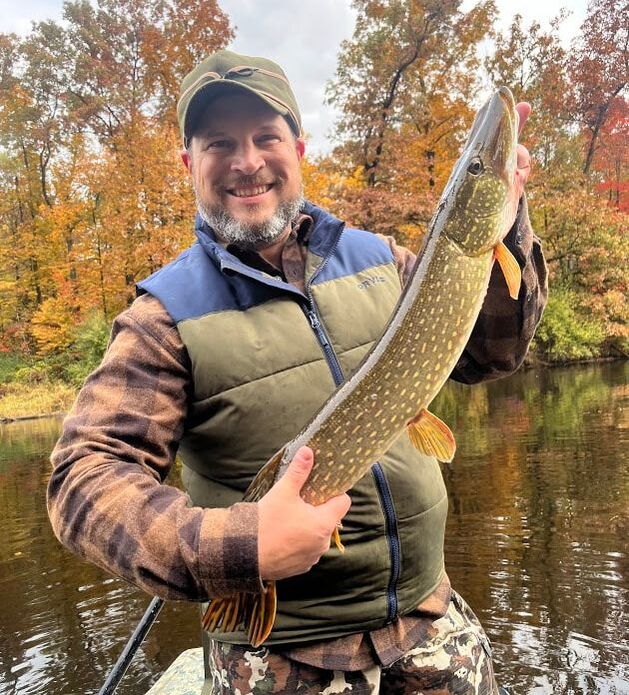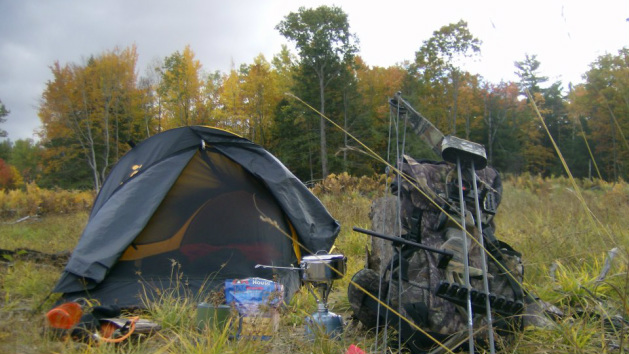|
By Drew YoungeDyke
It would be nice if hunting never got to this point: where the single-minded focus of killing a big buck sometimes overshadows the cultural and culinary experience of hunting an elusive animal and honoring it by sharing its meat with friends, family and the needy. Anyone who watches much outdoor TV, though, could hardly deny that it has reached that point. A new package of bills in the Michigan Senate, though, will crack down on trophy poachers, trespassers and out-of-state violators. Senate Bills 1340 and 1341, introduced by Sen. Phil Pavlov (R – St. Clair Twp.) and Sen. Tom Casperson (R – Escanaba), respectively, increase the fines for poaching and trespassing. The current restitution payment to the state for poaching a deer is $1,000, in addition to criminal penalties, fines and license suspensions. Sen. Pavlov’s bill, SB 1340, adds an additional restitution fine for bucks with scores of over 100 inches at a rate of 1.65 times the antler score. For example, a poached buck that scores 100 would put the violator on the hook for at least $1,165 ($1,000 plus an extra $165). As the size of the rack goes up, so does the fine. SB 1341, which is tie-barred to SB 1340 (neither becomes law unless both do) increases the fine which must be paid to a landowner by a violator who trespasses to hunt, fish or trap. SB 1348, introduced by Sen. Howard Walker (R-Traverse City), strengthens Michigan’s involvement in the Interstate Wildlife Violator Compact, an agreement among 38 states to honor each other’s hunting, fishing and trapping license suspensions and revocations. That means that someone who, for example, loses their hunting license in Montana for poaching elk, in Alaska for poaching bear, or California for poaching deer will be denied a Michigan hunting license, too. Michigan was already part of the compact, but due to the wording of the existing law, the DNR could not fully recognize other states’ suspensions and revocations. This bill will allow Michigan to be a full partner in the compact. As the percentage of Americans who hunt rebounds after declining for decades, it becomes increasingly important for hunters to make sure that we police our own. Some prominent hunting voices scoff at ethics and apologists say that we have to accept every unethical form of hunting, lest we be divided and conquered by anti-hunting groups. The reality, though, is that we still make up a minority of voters – about 20%, depending on the year - and allowing the unethical few to be the image that non-hunters have of us will harm our continued right to hunt more than anything anti-hunters are capable of. The history of conservation has primarily been that of hunters policing themselves. After game populations were slaughtered – sometimes to extinction – by market hunters in the late 1800’s, it was hunters and anglers who pushed for season and bag limits to ensure that there would always be animals to hunt and fish to catch. After all, “the predator husbands his prey,” as observed by Jim Harrison and noted by Steven Rinella. Protecting animals and places to hunt and fish are the historical roots of the modern conservation movement (and not bizarre U.N. conspiracy theories, despite what you may have heard recently). Hunters should support these bills because it tells the non-hunting public that we believe in ethical hunting and are willing to back it up by punishing those who violate game laws, especially when they do it for unethical reasons. While poaching any deer is unlawful, it’s a little more understandable when done to fill the freezer of a hungry family. When someone poaches for ego, though - just for the bragging rights of a big rack - it makes the stomach churn and warrants a larger fine. These bills – SB 1340, 1341 and 1348, should deter trophy poachers and trespassers, and ensure that those who have misbehaved in other states can’t bring their unethical ways back to Michigan. After some of the anti-conservation bills that have moved through the Legislature this year, these ones are a breath of fresh air. Let’s hope the Legislature makes them a priority during the post-election lame duck session. by Drew YoungeDyke
If Teddy Roosevelt's national parks are "America's Best Idea," as posited by documentary filmmaker Ken Burns, then the Natural Resources Trust Fund might be "Michigan's Best Idea." When oil wells were proposed in the Pigeon River Country -- a 100,000-acre wilderness tract in northern Michigan and the brainchild of Aldo Leopold protégé P.S. Lovejoy -- conservationists and energy interests argued, fought, and eventually compromised on a plan to use the proceeds from state oil and gas royalties to fund the acquisition, development and protection of public recreation land. Since 2010, though, when the Trust Fund reached its $500 million cap after a record-breaking auction of state-owned mineral rights, a limitless deluge of legislation has been introduced to divert, micro-manage, and subvert the purpose of the Trust Fund. Never mind that the people of Michigan put the Trust Fund into the Constitution and under the control of a Trust Fund Board in 1984 to keep it away from the Legislature after multiple legislative raids for other purposes. The current Legislature sees a big pot of money which they don't control, and they've used excuses ranging from local taxes to bizarre conspiracy theories to back Trust Fund-raiding bills. Some of them have even become law; thankfully, most have not. The bills introduced this legislative term seek to impact the Trust Fund in three primary ways; they either limit the purpose of the Trust Fund, divert the funds to other uses, or exert legislative control over which projects are funded. While some of the bills may have genuine motives behind them, the sheer number of bills trying to pry money out of the Trust Fund cannot be ignored. In the "subvert the purpose" of the Trust Fund category are bills to limit public outdoor recreation land in Michigan. Without the ability to purchase additional land, the Trust Fund would lose its primary purpose, though development grants to local communities would still be allowed. These proposals would make the Trust Fund idle, and idle money is vulnerable money. HB 4473, sponsored by Rep. Ed McBroom (R – Vulcan), and SB 248, as originally introduced by Sen. Tom Casperson (R – Escanaba), would have put hard caps on state land ownership. (The version of SB 248 that was signed into law included a temporary statewide cap and a removable northern Michigan cap, contingent on legislative approval of a land acquisition plan. While still a terrible bill, tough opposition from conservation groups helped force it to be a little less terrible). The stated rationale behind the land cap bills was the shorting of payments-in-lieu of taxes (PILTs) by the DNR to local governments. However, the DNR can only pay what the Legislature appropriates to it, and the legislators pushing these bills could appropriate adequate funding to the DNR if that was a priority. A separate package of bills authorized PILT payments from the Trust Fund for Trust Fund purchases, which isallowed in the Constitution and illustrates a more direct way to address the PILT issue. More disturbing is the idea that these bills are based on a bizarre conspiracy theory proposing that the United Nations is trying to take away private land rights by conspiring with state agencies to buy public land that will be off-limits to humans. As ridiculous as this sounds, supporters of SB 248 cited it in written testimony and a group of representatives actually introduced a bill to stop this phantom conspiracy, called Agenda 21. It's probably easier for them to position themselves as protectors of private land against the evil UN than it is for them to admit that they're really just abandoning the conservation heritage of Teddy Roosevelt. Either way, conspiracy theories are a terrible basis for Michigan conservation policy. Some of the bills are a little more brash about diverting Trust Fund money.HB 4021, sponsored by Rep. Dave Agema (R – Grandville) would divert 20% of oil and gas royalties to an aeronautics fund and 60% to the transportation fund, leaving a scant 20% for outdoor recreation opportunities for present and future generations. Similarly, SB 1273, introduced by Sen. Bruce Caswell (R - Hillsdale), would divert oil and gas revenues into the transportation fund after the State Parks Endowment Fund reaches its $800 million cap (royalties have gone into this fund since the Natural Resources Trust Fund reached its cap). The theory behind the Trust Fund is that minerals like oil and gas are nonrenewable resources that belong to current and future generations, and so current and future generations should benefit from their sale. Road repairs don't even last long enough to benefit this generation, let alone future ones. Those royalties should continue to conserve our natural resources in compensation for the natural resource rights that are sold. Sen. Casperson, who owns a log trucking business, also introduced bills SB 822 and SJR Q to amend the Michigan Constitution to use Trust Fund dollars to build logging and mining roads and fund dredging operations. Finally, there are bills that would exert legislative control over the selection of Trust Fund projects. These bills started with Rep. McBroom's proposed amendment to the annual Trust Fund appropriation bill, HB 5364, to remove four eco-regional acquisition projects that provide money for the DNR to acquire private in-holdings in existing tracts of state land that become available for purchase throughout the year. The House rejected the amendment and voted to fund all four projects, but the Senate removed them. In a conference committee to reconcile the two versions of the bill, the funding for the northern Lower Peninsula and Upper Peninsula eco-region acquisitions was stripped from the bill. Since then, Rep. McBroom introduced HB 5944 to prohibit any future eco-regional project recommendations and Sen. Darwin Booher introduced SB 1238 that would have packed the Trust Fund Board with two extra Legislature-approved members, imposed term limits on the board, prohibited any acquisitions which were solicited by the DNR, a local township or a land conservancy, and required the board prioritize motorized use projects. A substitute version of the bill keeps the term limits and the motorized prioritization, even though there are already three times as many motorized as non-motorized pathways in the trail system. A provision in the substitute bill prohibits purchases in which the sale was involuntary, as if this was necessary, since the Trust Fund Board'sinternal procedures already forbid involuntary acquisitions. These legislative intrusions into a process that is the province of a Constitutionally-mandated executive agency board are contrary to the intent of the Michigan Constitution. Article IV, Section 35 of the Michigan Constitution specifies that Natural Resources Trust Fund projects shall be recommended by the Trust Fund Board. The Michigan Supreme Court has held that boards are presumed to carry out the duties assigned to them, and to this end the Trust Fund Board has developed policies, procedures and priorities to comply with their constitutional mandate. The Trust Fund Board has set out specific criteria for evaluated projects proposed for funding. Their priorities for 2012 include trails and greenways, wildlife and ecological corridors and winter deeryards, and projects in urban areas. When the Legislature forbids eco-region projects and requires the board to prioritize motorized use projects, it violates the intent of the Constitution to have the Trust Fund Board decide which projects will or will not receive funding. The citizens of Michigan put the Trust Fund into the Constitution to keep it away from the Legislature after it was diverted for other uses; legislators have no business micromanaging the selection process, diverting funds, or subverting the purpose of the Trust Fund. People who care about conservation of public lands and outdoor recreation have to speak up, though, or our silence will be assumed to be acquiescence. Henry David Thoreau wrote, "Let every man make known what kind of government would command his respect, and that will be one step toward obtaining it." We do have to speak up, though; Michigan's best idea can't go down without a fight. |
AUTHOR
Drew YoungeDyke is an award-winning freelance outdoor writer and a Director of Conservation Partnerships for the National Wildlife Federation, a board member of the Outdoor Writers Association of America, and a member of the Association of Great Lakes Outdoor Writers and the Michigan Outdoor Writers Association.
All posts at Michigan Outside are independent and do not necessarily reflect the views of NWF, Surfrider, OWAA, AGLOW, MOWA, the or any other entity. ARCHIVES
June 2022
SUBJECTS
All
|



 RSS Feed
RSS Feed